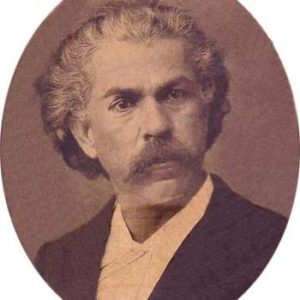
Antonio Gomes
Antônio Carlos Gomes was born on this date in 1836. He was an Afro Brazilian composer and one of the world's most distinguished 19th-century operatic composers.
He was born in Campinas, São Paulo State, the son of the Maestro Manuel José and Fabiana Maria Jaguari Cardoso. His childhood musical tendencies were soon stimulated by his father and by his older brother, José Pedro de Sant'Ana Gomés, also a conductor. José Pedro was the most dedicated guide and adviser in his brother’s artistic career. He convinced Antônio to visit the Court, where he became the protegé of Emperor Dom Pedro II, who was famous for his interest in the careers of Brazilian artists and intellectuals. The Emperor allowed Antônio Carlos to study at the Musical Conservatory of Rio de Janeiro.
Gomes graduated with honors and produced his first opera, A Noite Do Castelo (September 1861), a big success. Two years later, he directed his second opera, Joana De Flandres, which was considered superior to the first.
These two pieces convinced the Emperor to offer him a prize to study in Italy. Carlos studied in Milan at the local Conservatory, graduating as a composer-conductor in 1866. He soon became famous within the European art world with his most well-known opera, Il Guarany, which was performed in 1870 at the Milan Scala Theater, a renowned venue for great lyrical performances.
Gomes wrote and performed many other notable musical plays, such as the operas Fosca (1873), considered by some critics as his masterpiece, Salvador Rosa (1874), Maria Tudor (1878), O Éscravo (1889), Condor (1891), and the symphonic poem, Colombo (1892).
Returning to Italy, Carlos Gomes married Adelina Peri, an Italian pianist he had met while studying in Milan. He then wrote the hymn Il Saluto del Brasile for the centenary of American Independence, performed in Philadelphia on July 19, 1876. Gomes, faithful to the monarchy and Dom Pedro II, refused the opportunity President Deodoro da Fonseca gave him to compose the new Brazilian National Anthem.
Economic difficulties forced him to leave Italy and go to Belém do Pará, the capital of the Brazilian province, which had supported him with great nobility. He was appointed to the Musical Conservatory, but by then, he was an older man and died there on September 16, 1896.